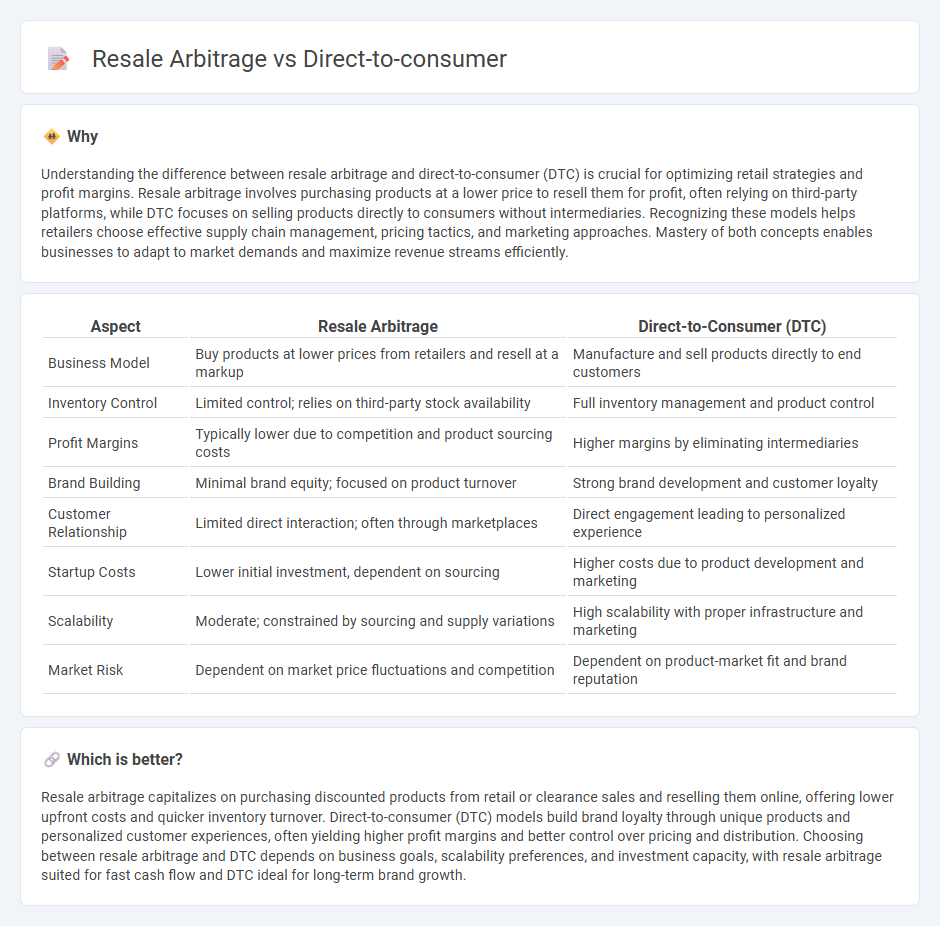
Resale arbitrage leverages sourcing discounted products from retail stores to sell at a markup, capitalizing on price differences and market demand. Direct-to-consumer (DTC) bypasses traditional retail channels by selling products directly through brand-owned websites or stores, enhancing profit margins and customer engagement. Explore the key differences and strategic benefits of resale arbitrage versus DTC models to optimize your retail approach.
Why it is important
Understanding the difference between resale arbitrage and direct-to-consumer (DTC) is crucial for optimizing retail strategies and profit margins. Resale arbitrage involves purchasing products at a lower price to resell them for profit, often relying on third-party platforms, while DTC focuses on selling products directly to consumers without intermediaries. Recognizing these models helps retailers choose effective supply chain management, pricing tactics, and marketing approaches. Mastery of both concepts enables businesses to adapt to market demands and maximize revenue streams efficiently.
Comparison Table
| Aspect | Resale Arbitrage | Direct-to-Consumer (DTC) |
|---|---|---|
| Business Model | Buy products at lower prices from retailers and resell at a markup | Manufacture and sell products directly to end customers |
| Inventory Control | Limited control; relies on third-party stock availability | Full inventory management and product control |
| Profit Margins | Typically lower due to competition and product sourcing costs | Higher margins by eliminating intermediaries |
| Brand Building | Minimal brand equity; focused on product turnover | Strong brand development and customer loyalty |
| Customer Relationship | Limited direct interaction; often through marketplaces | Direct engagement leading to personalized experience |
| Startup Costs | Lower initial investment, dependent on sourcing | Higher costs due to product development and marketing |
| Scalability | Moderate; constrained by sourcing and supply variations | High scalability with proper infrastructure and marketing |
| Market Risk | Dependent on market price fluctuations and competition | Dependent on product-market fit and brand reputation |
Which is better?
Resale arbitrage capitalizes on purchasing discounted products from retail or clearance sales and reselling them online, offering lower upfront costs and quicker inventory turnover. Direct-to-consumer (DTC) models build brand loyalty through unique products and personalized customer experiences, often yielding higher profit margins and better control over pricing and distribution. Choosing between resale arbitrage and DTC depends on business goals, scalability preferences, and investment capacity, with resale arbitrage suited for fast cash flow and DTC ideal for long-term brand growth.
Connection
Resale arbitrage and direct-to-consumer (DTC) share a fundamental connection through consumer demand for unique and affordable products sourced from various channels. Retailers engaging in resale arbitrage acquire discounted or clearance items to resell at a profit, often leveraging online marketplaces integrated with DTC platforms to reach end customers directly. This strategy enhances inventory turnover and provides consumers with diverse options, driving growth in both secondary markets and DTC retail ecosystems.
Key Terms
Brand Ownership
Direct-to-consumer (DTC) models allow brands to maintain full ownership and control over product presentation, pricing, and customer data, driving stronger brand loyalty and higher profit margins. Resale arbitrage involves purchasing products from third-party sellers or marketplaces, limiting brand control and typically resulting in reduced profit per unit due to increased competition and fees. Explore how brand ownership strategies impact scalability and long-term business success.
Inventory Control
Direct-to-consumer (DTC) models enable brands to maintain tight inventory control by managing production, storage, and distribution directly, reducing excess stock and enhancing supply chain transparency. Resale arbitrage relies on purchasing inventory from third-party sellers or discount outlets, introducing variability and less predictability in stock levels and product availability. Explore detailed strategies for optimizing inventory control in both DTC and resale arbitrage for better operational efficiency.
Profit Margin
Direct-to-consumer (DTC) business models often boast higher profit margins due to the elimination of intermediaries, allowing brands to set optimal pricing and retain full revenue. Resale arbitrage involves purchasing products at retail or discounted prices and reselling them for profit, but this method typically incurs higher costs and slimmer margins due to market competition and fees. Explore detailed strategies and margin comparisons to maximize your earning potential.
Source and External Links
Direct-to-consumer - Direct-to-consumer (DTC) is a business model where brands sell products directly to customers, bypassing third-party retailers or wholesalers; often transacted online, it allows brands like Allbirds and Warby Parker to control the sales process and customer relationship.
What Is Direct-to-Consumer? Everything You Need To ... - The DTC model lets brands sell directly to buyers through their own online stores, enabling full control of marketing, fulfillment, and customer feedback, which helps build better relationships and targeted customer experiences.
Direct to Consumer (DTC) Definition - Glossary - DTC is a sales strategy where manufacturers sell directly to consumers, often online, to adapt to increasing digital shopping habits; many traditional brands, like Nike, have adopted this model to gain more control over sales and customer interaction.
 dowidth.com
dowidth.com